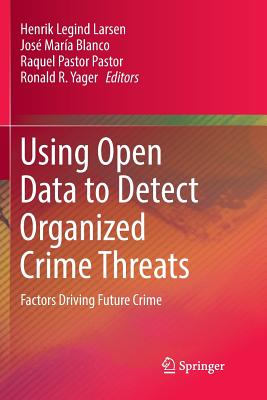Using Open Data to Detect Organized Crime Threats: Factors Driving Future Crime
暫譯: 利用開放數據偵測有組織犯罪威脅:驅動未來犯罪的因素
Larsen, Henrik Legind, Blanco, Jose Maria, Pastor Pastor, Raquel
- 出版商: Springer
- 出版日期: 2018-07-19
- 售價: $4,230
- 貴賓價: 9.5 折 $4,019
- 語言: 英文
- 頁數: 282
- 裝訂: Quality Paper - also called trade paper
- ISBN: 3319849662
- ISBN-13: 9783319849669
-
相關分類:
Data-mining
海外代購書籍(需單獨結帳)
相關主題
商品描述
This work provides an innovative look at the use of open data for extracting information to detect and prevent crime, and also explores the link between terrorism and organized crime. In counter-terrorism and other forms of crime prevention, foresight about potential threats is vitally important and this information is increasingly available via electronic data sources such as social media communications. However, the amount and quality of these sources is varied, and researchers and law enforcement need guidance about when and how to extract useful information from them.
The emergence of these crime threats, such as communication between organized crime networks and radicalization towards terrorism, is driven by a combination of political, economic, social, technological, legal and environmental factors. The contributions to this volume represent a major step by researchers to systematically collect, filter, interpret, and use the information available. For the purposes of this book, the only data sources used are publicly available sources which can be accessed legally and ethically.This work will be of interest to researchers in criminology and criminal justice, particularly in police science, organized crime, counter-terrorism and crime science. It will also be of interest to those in related fields such as applications of computer science and data mining, public policy, and business intelligence.
商品描述(中文翻譯)
這本著作提供了一個創新的視角,探討如何利用開放數據來提取信息以偵測和預防犯罪,並且還探討了恐怖主義與有組織犯罪之間的聯繫。在反恐和其他形式的犯罪預防中,對潛在威脅的預見至關重要,而這些信息越來越多地通過電子數據來源(如社交媒體通信)獲得。然而,這些來源的數量和質量各不相同,研究人員和執法機構需要指導,以了解何時以及如何從中提取有用的信息。
這些犯罪威脅的出現,例如有組織犯罪網絡之間的通信和向恐怖主義的激進化,是由政治、經濟、社會、技術、法律和環境等多種因素的綜合作用所驅動。本書中的貢獻代表了研究人員在系統性地收集、過濾、解釋和使用可用信息方面邁出的重要一步。就本書而言,唯一使用的數據來源是可以合法和道德地訪問的公開來源。
這本著作將對犯罪學和刑事司法領域的研究人員特別感興趣,尤其是在警察科學、有組織犯罪、反恐和犯罪科學方面。它也將吸引相關領域的人士,如計算機科學和數據挖掘的應用、公共政策和商業智能。
作者簡介
Henrik Legind Larsen, professor, Aalborg University, Denmark, and CEO of Legind Technologies, Denmark, was scientific-technical manager of the ePOOLICE project and organiser of the workshop on Factors Driving Future Crime that gave rise to this book. His main research is in intelligent information systems, flexible information access, and fuzzy logic based technologies. He is cofounder of the international conferences series on Flexible Query Answering Systems, which he last was general chair of in 2013 (FQAS 2013). He is member of the editorial boards of the journals Fuzzy Sets and System and International Journal of Uncertainty, Fuzziness, and Knowledge-based Systems. His scientific publication comprises 78 papers.
José María Blanco is the Head of the Centre of Analysis and Foresight in Guardia Civil. Co-director of Strategic Studies and Intelligence in the Institute of Forensic Sciences and Security (University Autónoma, Madrid). Adviser in the Universitary Institute of Homeland Security. Editor of the academic-professional journal "Cuadernos de la Guardia Civil." Professor of intelligence studies, terrorism, and organised crime in several universities. Researcher in European Union funded projects. Editor of the book "Seguridad Nacional: amenazas y respuestas," ed. LID (2015). He has published several papers, articles and reports in media, think tanks and academic journals.
Raquel Pastor received her M.Sc. degree in Telecommunications Engineering from Polytechnic University of Madrid. She has a professional career of over 25 years, having worked both nationally and internationally at private and public sectors. She joined Isdefe, Spanish state-owned company of Defence Ministry, in 2003 as responsible of the Software Engineering Group within the Defence and Security Directorate, and worked on several Intelligence and Electronic warfare projects for the Spanish Defence Ministry. Contract Manager of FP7 European OSINT projects within the Surveillance Technologies Department of Isdefe, she worked as WP leader in European FP7 co-funded VIRTUOSO project on OSINT and Intelligent surveillance and enhancing border security and she managed as Project Coordinator the European FP7 ePOOLICE project, on Early Warning and Environmental Scanning for the detection of organized crime threats.
Ronald R. Yager is Director of the Machine Intelligence Institute and Professor of Information Systems at Iona College. He is editor and chief of the International Journal of Intelligent Systems. He has published over 500 papers and edited over 30 books in areas related to fuzzy sets, human behavioral modeling, decision-making under uncertainty and the fusion of information. He is among the world's top 1% most highly cited researchers with over 52,000 citations in Google Scholar. He was the recipient of the IEEE Computational Intelligence Society Pioneer award in Fuzzy Systems. He received the special honorary medal of the 50-th Anniversary of the Polish Academy of Sciences. He received the Lifetime Outstanding Achievement Award from International the Fuzzy Systems Association. He recently received honorary doctorate degrees, honoris causa, from the Azerbaijan Technical University and the State University of Information Technologies, Sofia Bulgaria. Dr. Yager is a fellow of the IEEE, the New York Academy of Sciences and the Fuzzy Systems Association. He has served at the National Science Foundation as program director in the Information Sciences program. He was a NASA/Stanford visiting fellow and a research associate at the University of California, Berkeley. He has been a lecturer at NATO Advanced Study Institutes. He was a program director at the National Science Foundation. He was a visiting distinguished scientist at King Saud University, Riyadh Saudi Arabia. He was an adjunct professor at Aalborg University in Denmark. He received his undergraduate degree from the City College of New York and his Ph. D. from the Polytechnic Institute New York University. He is the 2016 recipient of the IEEE Frank Rosenblatt Award the most prestigious honor given out by the IEEE Computational Intelligent Society. He recently edited a volume entitled Intelligent Methods for Cyber Warfare.
作者簡介(中文翻譯)
亨利克·萊金德·拉爾森,丹麥奧爾堡大學教授及Legind Technologies公司首席執行官,曾擔任ePOOLICE專案的科學技術經理,並組織了促成本書的「驅動未來犯罪的因素」研討會。他的主要研究領域包括智能信息系統、靈活的信息訪問和基於模糊邏輯的技術。他是靈活查詢回答系統國際會議系列的共同創辦人,並於2013年擔任該會議的總主席(FQAS 2013)。他是《模糊集與系統》和《國際不確定性、模糊性與知識基礎系統期刊》的編輯委員會成員。他的科學出版物包括78篇論文。
荷西·瑪麗亞·布蘭科是西班牙國民警衛隊分析與預測中心的負責人。擔任馬德里自治大學法醫科學與安全研究所的戰略研究與情報共同主任。是國土安全大學研究所的顧問。《國民警衛隊學報》的編輯。多所大學的情報研究、恐怖主義和有組織犯罪教授。參與歐盟資助的研究專案。編輯了《國家安全:威脅與應對》一書,出版於LID(2015年)。他在媒體、智庫和學術期刊上發表了多篇論文、文章和報告。
拉奎爾·帕斯托於馬德里理工大學獲得電信工程碩士學位。她擁有超過25年的專業經歷,曾在私營和公共部門工作,涵蓋國內和國際。她於2003年加入西班牙國防部的國有公司Isdefe,擔任國防與安全總局內的軟體工程小組負責人,並參與多個西班牙國防部的情報和電子戰專案。作為Isdefe監控技術部門FP7歐洲OSINT專案的合約經理,她在歐洲FP7共同資助的VIRTUOSO專案中擔任工作包負責人,專注於OSINT和智能監控及加強邊界安全,並作為專案協調員管理歐洲FP7 ePOOLICE專案,專注於有組織犯罪威脅的早期預警和環境掃描。
羅納德·R·耶格是機器智能研究所所長及艾奧納學院信息系統教授。他是《國際智能系統期刊》的主編。他在模糊集、人類行為建模、不確定性下的決策和信息融合等領域發表了超過500篇論文,並編輯了超過30本書籍。他是全球前1%被引用最多的研究者之一,在Google Scholar上擁有超過52,000次引用。他曾獲得IEEE計算智能學會模糊系統先驅獎,並獲得波蘭科學院50周年特別榮譽獎章。他獲得國際模糊系統協會的終身傑出成就獎。最近,他獲得阿塞拜疆技術大學和保加利亞索非亞國立信息技術大學的榮譽博士學位。耶格博士是IEEE、紐約科學院和模糊系統協會的會士。他曾在國家科學基金會擔任信息科學計畫的計畫主任。他曾是NASA/史丹佛大學的訪問學者,並在加州大學伯克利分校擔任研究助理。他曾在北約高級研究所擔任講師,並在國家科學基金會擔任計畫主任。他曾在沙烏地阿拉伯利雅德的沙烏地國王大學擔任訪問傑出科學家,並在丹麥奧爾堡大學擔任兼任教授。他在紐約市立大學獲得學士學位,並在紐約大學理工學院獲得博士學位。他是2016年IEEE Frank Rosenblatt獎的獲得者,該獎是IEEE計算智能學會頒發的最具聲望的榮譽。他最近編輯了一本名為《網絡戰爭的智能方法》的書籍。












